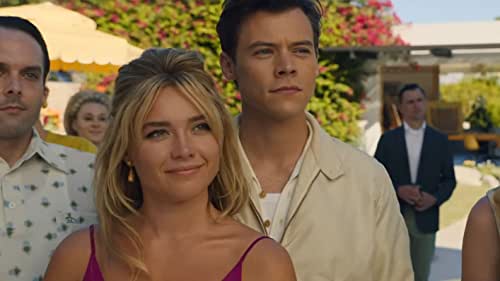
In our increasingly polarized country, people are increasingly feeling as if they have to dig their heels into the political landscape and choose a side. At times, it feels as if political polarization has slowly seeped into every corner of our lives, with entertainment being no different. Increasingly, television shows and films have begun to feel like equal parts political ad and content. As this kind of storytelling becomes more and more prominent, the question becomes how far can this pendulum swing before we reach the breaking point? This is the question that I had while watching the highly anticipated, and now highly controversial, sophomore effort from actress and burgeoning director Olivia Wilde.
Don’t Worry Darling follows 1950s housewife Alice Chambers (Florence Pugh) living with her husband Jack (Harry Styles) in a utopian, experimental company town called Victory. Despite their seemingly idyllic surroundings, Alice begins to worry that his glamorous company and its Svengali-like leader Frank (Chris Pine) could be hiding disturbing secrets.
This is a film that wears its political bent on its sleeve, which wouldn’t be an issue if it didn’t follow in the footsteps of an increasing number of modern entertainment and emphasize its political viewpoint at the expense of a good story first and foremost. As Alice slowly begins to uncover that Victory is not all that it seems, particularly for its female inhabitants, it becomes clear that the quaint community that seems idyllic on the surface but hides nefarious, abusive secrets is a metaphor for the institution of marriage itself; a system of control and figurative imprisonment for the capable women present within it who are subjugated by their inadequate male partners. Perhaps the portrayal of this metaphor serves as a creative catharsis for Wilde given the recent developments in her personal life, and if so, some leeway for this would usually be extended for filmmakers under this circumstance, but that’s only if the therapeutic double meaning is couched within a good story that stands on its own and isn’t just used as bullhorn conduit for working through personal frustrations. Wilde and writer Katie Silberman instead craft a film that plods along and does little to compelling take the audience alongside Alice as she uncovers the mystery surrounding Victory, settling for vague “something isn’t right” vibes that take forever to get to what that something is with few breadcrumbs in-between. A good mystery reveals parts of the whole bit by bit to keep audiences invested and compelled which is sorely missing in Don’t Worry Darling’s first two acts.
What is present instead is an unimaginative story devoid of thematic heft that just wants to tell the audience loudly that men can’t handle strong successful women. It’s a takes two hours to communicate a generic platitude to its viewers that they can just open Twitter or Tik Tok and read or hear in under five seconds. This isn’t the fault of Don’t Worry Darling’s actors who display their skill as best they can with the material that they are given, including Harry Styles who was more adequate in his role than has been advertised. Pugh is the film’s lead and is her usual incredible self, pulling the film along and providing the audience with something to be compelled by and invested in watching. Although the script isn’t actually giving us much, Pugh’s acting out of what is there can at times mask that not much is really moving along. Pine is adequate as the shadowy puppet master of Victory and his duel with Alice at the dinner table kickstarts the film’s third act when the plot finally begins to move along. Styles is serviceable alongside Pugh, particularly during a pivotal moment following the dinner confrontation between Alice and Frank where his acting rises to the moment.
While watching Don’t Worry Darling unfold and contemplating what I was watching, I wrote in my notebook that with this film and her directorial debut breakout effort Booksmart, which I was in the minority in disliking, she seems to believe that she has cracked the code for garnering cheap praise as a female director; crafting films that offer surface level girl boss feminist messaging and critiques of the patriarchy. The film feels emblematic of a troubling trend in modern filmmaking where getting across the message of your film takes precedence over the craftsmanship and quality of the film itself. Don’t Worry Darling is thin on a compelling story and try as they may, the actors cannot save it fully despite Florence Pugh performing to her fullest capabilities. When the tides will shift, I do not know, but if American cinema wants to increase its quality and get butts in seats again, a return to focusing on compelling storytelling and not setting social narratives is paramount.
Image: Warner Bros.

